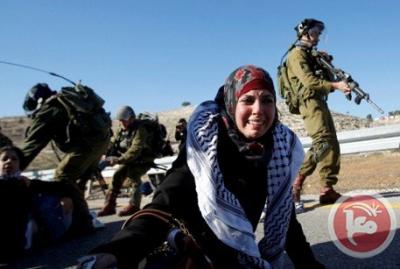
International outrage follows death of West Bank protester

Hundreds of Palestinians gathered in the West Bank Dec. 11 to mourn the death of a Palestinian protester who died after being hit in the face by a tear-gas canister fired by Israeli troops at the village of Nabi Saleh two days earlier. The body of 28-year-old Mustafa Tamimi was carried in a procession that began in the West Bank capitol of Ramallah ending 10 kilometers north at his home village, which hosts weekly protests against land confiscation for an illegal settlement.
Linah Alsaafin, a Ramallah-based blogger reported live from the scene in Nabi Saleh during the Friday protest in which Tamimi was mortally wounded. He "was throwing rocks at the [Israeli army] jeep, the door opened and the canister was fired with precision and intent straight in his face," she Tweeted. "To use their term, 'surgical precision.'" (CNN, Dec. 11; Ma'an News Agency, Dec. 9)
European Union foreign policy chief Catherine Ashton issued a statement saying she "deeply regrets the tragic death of Mustafa Tamimi," and protesting "the disproportionate use of force under any circumstances." (JP, Dec. 14)
The death of Tamimi comes as an international coalition of 20 leading aid agencies and human rights groups issued new findings that Israeli authorities have stepped up unlawful demolitions in the West Bank, including East Jerusalem over the past year—displacing a record number of Palestinian families from their homes. The statement was timed to coincide with the Jerusalem meeting of the Middle East Quartet in its latest effort to revive peace talks. The humanitarian and rights groups, including Amnesty International, Human Rights Watch, and Oxfam International, are calling for the Quartet to hold all parties to the conflict to their obligations under international law. Said Jeremy Hobbs, executive director, Oxfam International: "The increasing rate of settlement expansion and house demolitions is pushing Palestinians to the brink, destroying their livelihoods and prospects for a just and durable peace. There is a growing disconnect between the Quartet talks and the situation on the ground. The Quartet needs to radically revise its approach and show that it can make a real difference to the lives of Palestinians and Israelis." (Amnesty International, Dec. 13)
Seth Morrison, a board member of the Jewish National Fund in Washington DC, announce this week that he has resigned in protest of the ongoing displacement of Palestinians on the West Bank and in East Jerusalem, especially citing land seizures under Israel's Absentee Property Law. Wrote Morrison in his resignation letter: "My commitment to building a safe and secure Israel has not changed. My admiration for much of JNF’s environmental work has not changed. What has changed is a sense of betrayal I have at learning that JNF is a force in preventing long-term peace." (The Forward, Dec. 23)
On Dec. 12, some 300 settlers hurled stones at Palestinian vehicles on the main road near the settlement of Ramat Gilad in response to rumors of an imminent eviction on Monday night. They also pelted stones at the jeep of a local Israeli army commander—and later launched an attack on the local base of the army's Ephraim Brigade, hurling paint, nails and rocks. Around 50 of them broke into the base and proceeded to vandalize vehicles, burn tires and throw stones at the brigade commander. Soldiers dispersed the rioters and detained one man. Another group of settlers under the "Hilltop Youth" banner meanwhile occupied a border post with Jordan. The border post occupation was a protest of Jordan’s efforts to intervene in Israel’s closure of a footbridge used by non-Muslims leading to the Temple Mount/Noble Sanctuary—seen by Muslims as a prelude to seizure or demolition of the holy site under the pretext of renovation. (Haartez, Dec. 14; YNet, NYT, Dec. 13
Two nights later, presumed Israeli rightists carried out an arson attack on an abandoned mosque in Jerusalem's Strauss Street. Firefighters were able to contain the blaze before serious damage was done. Security officials found graffiti defaming Islam and Arabs on the building's walls, as well as the words "price tag"—an Israeli right-wing slogan for revenge attacks for moves against West Bank settlers. (YNet, Dec. 14)

